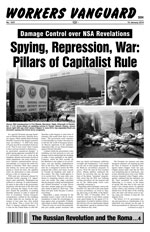
Defend South Korean Rail Union! JANUARY 6—On December 30, after a brutal campaign of repression by the South Korean government, the Korean Railway Workers Union (KRWU) ended a 22-day-long strike against the state-owned company KORAIL. In the longest rail strike in the country’s history, some 8,700 workers stopped work to fight plans to set up a KORAIL subsidiary, which the union denounced as a move toward privatization. The right-wing government of President Park Geun-hye pulled out all the stops to break the strike, which it deemed illegal. While the company suspended nearly 8,000 strikers, police raided KRWU offices in five cities and warrants were issued for the arrest of 35 union leaders on charges of “obstruction of businesses.” When the union refused to back down, on December 22 some 4,000 riot police surrounded the Seoul headquarters of the Korean Confederation of Trade Unions (KCTU), of which the KRWU is a member, and stormed the building, attacking and pepper-spraying workers defending it. Some 130 were arrested, but the union leaders were not found and several went into hiding. While 13 are still at large, six have been indicted. The jobs of nearly 500 strikers have been threatened. No reprisals against the KORAIL strikers and their union leaders! Free all arrested strikers! Drop all the charges! The union ended the strike, which had severely disrupted passenger and freight transport, after reaching an agreement with Park’s New Frontier Party and the rival bourgeois Democratic Party. A parliamentary committee composed of members of both ruling-class parties has been established “to further discuss the issues that led to the strike and the long-term development of rail industry” (Wall Street Journal, 30 December 2013). Regardless, the government has proceeded with its plan to issue a license for a subsidiary to operate a high-speed rail line in the south of the country. The union has filed a lawsuit against the Ministry of Land, Infrastructure and Transport, which controls the railways, calling for the license to be revoked, and the KCTU has vowed to mobilize workers to demand Park’s resignation. Meanwhile, the government continues to pursue union leaders. KORAIL has sued the union, demanding over 15.2 billion won ($14.5 million) for operating losses during the strike. The company, which has blood on its hands for the death of an 84-year-old woman boarding a train operated by scab labor, is vindictively seeking to extort payment from the union for “hiring and personnel costs” for 208 scabs recruited to break the strike. On December 28, up to 100,000 people rallied in defense of the 700,000-strong KCTU. The Korean Federation of Trade Unions (KFTU), which was long tied to South Korea’s capitalist government, also endorsed the call for this mobilization. Statements of solidarity have come in from unions around the world. The KCTU has planned further nationwide actions on January 9 and 16. The capitalist state has had a vendetta against the KCTU since its founding in 1995. It launched a general strike the following year, calling out its 500,000 members and shutting down production at strategic companies like Hyundai, Daewoo, Kia and Ssangyong. The KFTU called out its members then as well. The current class battle comes amid a series of attacks on the workers movement and dissident political parties by the government under Park Geun-hye, the daughter of Park Chung-hee, who headed South Korea’s brutal anti-Communist military dictatorship for close to 20 years. A leader and several members of the Unified Progressive Party are currently being tried for sedition, while the government is moving to ban the party for supporting North Korea, a bureaucratically deformed workers state, and plotting to “stage revolutions.” Two days after the attack on KCTU headquarters, President Park visited soldiers near the Demilitarized Zone between North and South Korea and told them that they should “mercilessly react” to any provocations from the North. It is the class duty of workers in South Korea and around the world to stand in defense of North Korea against imperialism and capitalist counterrevolution. The U.S. and allied imperialists and their South Korean henchmen slaughtered more than three million Koreans and reduced much of the peninsula to rubble in the 1950-53 Korean War in an attempt to roll back social revolution. The American proletariat has a special obligation to demand all U.S. troops out of South Korea, where the imperialist military presence continues to target the North Korean and Chinese deformed workers states and helps fortify capitalist rule against the combative proletariat in the South. As Marxists, we stand for the revolutionary reunification of the Korean peninsula: socialist revolution in the South to overthrow capitalist rule and workers political revolution in the North to oust the corrupt, nepotistic Stalinist bureaucracy that exists as a parasite on the workers state. From the Korean Peninsula to the U.S. and Japanese imperialist heartlands and beyond, what is needed is to forge revolutionary workers parties to lead the fight for proletarian rule.
|
|
||||||||||||||||||||||||||||||||||||||||||
